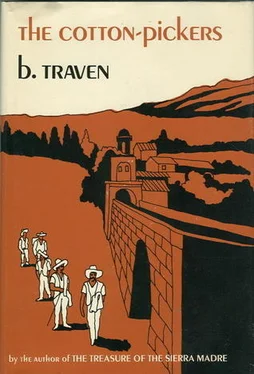B. Traven - The Cotton-Pickers
Здесь есть возможность читать онлайн «B. Traven - The Cotton-Pickers» весь текст электронной книги совершенно бесплатно (целиком полную версию без сокращений). В некоторых случаях можно слушать аудио, скачать через торрент в формате fb2 и присутствует краткое содержание. Год выпуска: 1969, Издательство: Hill and Wang, Жанр: Проза, на английском языке. Описание произведения, (предисловие) а так же отзывы посетителей доступны на портале библиотеки ЛибКат.
- Название:The Cotton-Pickers
- Автор:
- Издательство:Hill and Wang
- Жанр:
- Год:1969
- ISBN:нет данных
- Рейтинг книги:3 / 5. Голосов: 1
-
Избранное:Добавить в избранное
- Отзывы:
-
Ваша оценка:
- 60
- 1
- 2
- 3
- 4
- 5
The Cotton-Pickers: краткое содержание, описание и аннотация
Предлагаем к чтению аннотацию, описание, краткое содержание или предисловие (зависит от того, что написал сам автор книги «The Cotton-Pickers»). Если вы не нашли необходимую информацию о книге — напишите в комментариях, мы постараемся отыскать её.
—Book World
The Cotton-Pickers — читать онлайн бесплатно полную книгу (весь текст) целиком
Ниже представлен текст книги, разбитый по страницам. Система сохранения места последней прочитанной страницы, позволяет с удобством читать онлайн бесплатно книгу «The Cotton-Pickers», без необходимости каждый раз заново искать на чём Вы остановились. Поставьте закладку, и сможете в любой момент перейти на страницу, на которой закончили чтение.
Интервал:
Закладка:
One morning the hotel tenant sent for a carpenter and instructed him to barricade the tank. Now Señor Doux ran to the police, for the building was his property and it was against the law for the tenant to build barricades on Doux’s roof. So during the night the tank was forced again, because Señor Doux’s establishment just had to have water.
There were, therefore, good and sufficient reasons for Señor Doux’s ghastly appearance and tremendous appetite. His first breakfast was followed by a better one at six, when he returned from his marketing. Now he had fish, roast beef, a half bottle of wine, and three or four slices of cake.
Meanwhile the first customers of the day were coming in; suppliers had to be bargained with and their accounts settled; the mail arrived. Then came the buyers for the baked goods, each making up his selection of bread, rolls, cakes, pastries, biscuits, and candied fruits.
At half past eight Señor Doux had what he called a regular breakfast, at which his wife joined him. This time there was an egg dish, two meat dishes, beer, and a large dessert, followed by coffee, with plenty of cream of course.
Señora Doux had the features of a pretty woman, but was more than plump. In contradiction to the idea that fat people are always jolly, Señora Doux was perpetually bad tempered. When exceptionally heavy orders for cakes and pastries came in, a faint smile appeared on her face, but it lasted for only a few seconds. The café might be full to the bursting point and customers fighting for seats, but Señora Doux would wear her sour expression and look at every new arrival as if he had done her a personal injury that increased the misery of her life. She never wore shoes, but always soft, felt slippers. She never went out — that is, I never saw her go out — for she was afraid that one of the waiters might steal money or food in her absence. Her eyes went everywhere; nothing happened in the place that she didn’t know about, or over which she had no control.
The thing she regretted most (actually she regretted everything) was that people, or at any rate she herself, had to sleep; for while she slept, something might happen that she couldn’t know about. For this reason she regarded no one with greater mistrust than the workers in the bakery. They worked during the night hours when Señora Doux just had to get some sleep in order to be able to supervise the café throughout the day and evening. Even so, she stayed up late into the night.
Señora Doux also took care of the cash till. Even if she could have brought herself to hire a Señorita for the job, no cashier would have worked with her for long. The Señorita might be as honest as the archangel with the sword, but Señora Doux still would have accused her several times a day of embezzling a few pesos.
It was a difficult business with the till. Señora Doux didn’t trust any waiter. She sat at the cash counter or wandered around the place observing what the guests were eating. When they paid, the waiter had to hand over the money at once. The Señora reasoned that if waiters were allowed to pocket the money they collected, amounting at times to hundreds of pesos, and to settle up at the end of the shift, there was nothing to prevent them from leaving hat and coat behind and walking off with the cash a quarter of an hour before quitting time. It must be admitted that such things happened, even when the waiter had collected only sixty or seventy pesos, but in the Café Aurora such a thing wasn’t possible.
On days when bakery orders were slack, the bakers and confectioners had a rough time. Señora Doux would intentionally order them around in such a way that one or another among them would ask for his money and leave, for on slack days she regarded the bakery expenses as so much wasted money. If on the following day the orders doubled or trebled, the men had to work three, four, or five hours more, since of course no new worker had been hired to replace the one who had quit.
The musicians in the café fared no better; in fact, worse. The bakers at least produced something; but in the minds of the Señor and Señora music was the most absurd waste of money imaginable. However, the neighboring cafés had music, so the Café Aurora had to have music too, if it was to stay in business. Señor Doux had a row with the orchestra every day. If the place was empty he told the musicians it was their fault because they played so badly. Sometimes, after such a row, the musicians packed up their instruments, asked for their money, and left. Señora Doux was well satisfied with this state of affairs as it enabled her to save money, and, besides, she could explain to the guests that the musicians had quit.
But after a few days the customers would get restless and demand music, so Señor Doux would have to run and look for musicians. On such occasions it might happen that he could get only one guitarist, and the customers would stay away until a good orchestra was hired. After a while there would be another row and the whole story would be repeated.
One day an excellent eight-piece orchestra arrived from Mexico City and offered its services to the various cafés, coming first to Doux in the Aurora.
“Fifty pesos a day for eight men? I’m not going to pay that! And their meals in the bargain? I’m not crazy. And contracted by the week, with three days’ notice? You can go all around this town and you won’t find any café owner crazy enough to take you on those terms. I’ll pay you twenty-five, on a daily basis. I can get musicians enough when I want them, on a day’s notice.”
So the orchestra went to another café and got what they asked for. As a result, that café was full of customers every night, despite the fact that people in this region don’t sit around at café tables or loaf in restaurants. Here, they usually stay just long enough to swallow their ice creams or sip their refresco drinks, and then they go. They prefer to promenade in the parks and squares, or to sit there on the benches rather than at café tables. But the music could hold customers for another iced drink or an extra bottle of beer, and that all the more readily since the café owner was decent enough not to put a surcharge on the drinks because of the musical entertainment.
The café where the new orchestra played to such crowds was only five doors away from the Aurora, and the Aurora was as empty as a coffin in a carpenter’s shop. The Señora wanted to turn off half the lights because they were burning unnecessarily, but her husband wouldn’t hear of it. Every hour he strolled over to the cinema without hat or jacket, ostensibly to look at the posters of the coming attractions. Actually he went to count the customers in the Moderna. He passed the competing café seemingly without turning his head, but in fact he saw every guest in the Moderna, and to his chagrin he saw many of his former clients.
For a few days he put up with it. Then he posted himself in front of his café and waited for the first violinist of the Moderna orchestra to come along.
“One moment, Señor!”
“Yes?”
“Wouldn’t you like to come and play here? I’ll pay you fifty.”
“I’m sorry, we’re getting sixty-five.”
“That I won’t pay.”
“Muy bien, Señor, adios.”
After a week had passed, he asked the first violinist once more: “All right, for fifty, Señor.”
“Settled. Agreed. From Friday, then.”
Señor Doux rushed in to his wife. “I’ve got the orchestra. For fifty!”
The orchestra had agreed to play for fifty because they had been given notice at the Moderna and had no other engagement in town. They were no longer a novelty and the customers were ready for something different.
The cream had been skimmed off. The Café Aurora was full enough, but not as full as the Moderna had been every night. So Señor Doux told the orchestra that they played abominably. The musicians wouldn’t take this, it led to a row, and they left the café; therefore Señor Doux didn’t have to pay “notice” wages, and so saved money once again.
Читать дальшеИнтервал:
Закладка:
Похожие книги на «The Cotton-Pickers»
Представляем Вашему вниманию похожие книги на «The Cotton-Pickers» списком для выбора. Мы отобрали схожую по названию и смыслу литературу в надежде предоставить читателям больше вариантов отыскать новые, интересные, ещё непрочитанные произведения.
Обсуждение, отзывы о книге «The Cotton-Pickers» и просто собственные мнения читателей. Оставьте ваши комментарии, напишите, что Вы думаете о произведении, его смысле или главных героях. Укажите что конкретно понравилось, а что нет, и почему Вы так считаете.











